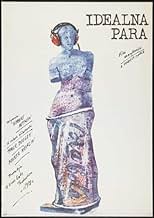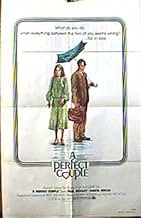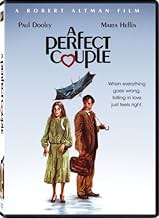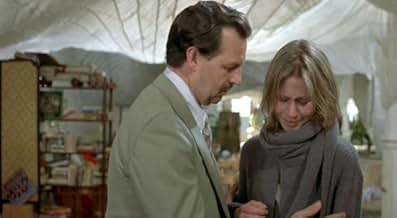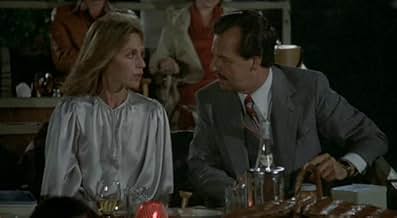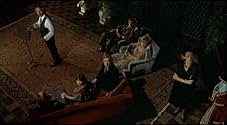IMDb-BEWERTUNG
5,9/10
1050
IHRE BEWERTUNG
Füge eine Handlung in deiner Sprache hinzuA repressed, middle-aged divorced U.S. Greek meets a young singer through a dating service and becomes smitten.A repressed, middle-aged divorced U.S. Greek meets a young singer through a dating service and becomes smitten.A repressed, middle-aged divorced U.S. Greek meets a young singer through a dating service and becomes smitten.
- Regie
- Drehbuch
- Hauptbesetzung
Empfohlene Bewertungen
I finally got around to seeing this for-many-years-as-good-as-lost Altman film, and I must say, I was extremely impressed. It is a highly unusual piece. Altman biographer Patrick McGilligan says "There is not another movie like it in the Altman canon," and he's not kidding; there is scarcely another movie like it in anyone's canon. The closest I can think of is George Romero's also criminally underrated There's Always Vanilla, which also deals with the arc of a romance between "ordinary" people with no touch of Hollywood iconography about them.
The film is conceived in terms of a number of binaries: two families, a rigidly patriarchal Greek family and a rock music collective with its own sort-of-patriarch; classical music and pop music, which join hands in the climax; a "perfect couple" of two decidedly imperfect, non-glamorous people, and a near-silent "imperfect couple" of two glamor-pusses, whose path repeatedly crosses that of the perfect couple, but in ways that only the audience perceives. (The perfect couple meets through a video dating service that is a direct precursor to the Internet dating services of our own day; that lends the film an oddly timely-contemporary touch.)
The rock music collective, Keeping 'Em Off the Streets, co-formed by Altman collaborator Allan Nicholls, actually existed and concertized a couple of times, but failed to win a recording contract. (The soundtrack was preserved on Altman's own Lion's Gate label; I recently scored a copy of this rare LP.) As many of the reviewers here at the IMDb enthuse, the music is quite delightful, and rather difficult to pigeonhole, with rock, pop, jazz, and theater music elements. There are a lot of musicians, a lot of singers, a lot of people (and even a dog) just hanging around, in somewhat elaborate and rather magical spaces (courtesy of master designer Leon Ericksen), and the musical numbers seem to emerge from the ambiance. The film is very driven by the songs.
Adding to the flavor of A Perfect Couple is a remarkably casual-positive attitude toward several gay and lesbian characters, so much so that Vito Russo singled the film out in his book The Celluloid Closet as being "special" for its era in its recognition of a "happy, well-adjusted" lesbian couple as a "family."
In the lead roles, Paul Dooley is remarkably winning, and Marta Heflin has a mysterious, somewhat withdrawn quality that suddenly announces itself forcefully in her one solo number, "Won't Somebody Care", which is also one of the great musical sequences in all of movies, if you ask me -- right up there with Keith Carradine's "I'm Easy" in Nashville.
The next forgotten Altman film that needs to be rehabilitated is H.E.A.L.T.H., which Helene Keyssar praises most interestingly in her book Robert Altman's America. I saw it only once many years ago and am eager to see it again.
The film is conceived in terms of a number of binaries: two families, a rigidly patriarchal Greek family and a rock music collective with its own sort-of-patriarch; classical music and pop music, which join hands in the climax; a "perfect couple" of two decidedly imperfect, non-glamorous people, and a near-silent "imperfect couple" of two glamor-pusses, whose path repeatedly crosses that of the perfect couple, but in ways that only the audience perceives. (The perfect couple meets through a video dating service that is a direct precursor to the Internet dating services of our own day; that lends the film an oddly timely-contemporary touch.)
The rock music collective, Keeping 'Em Off the Streets, co-formed by Altman collaborator Allan Nicholls, actually existed and concertized a couple of times, but failed to win a recording contract. (The soundtrack was preserved on Altman's own Lion's Gate label; I recently scored a copy of this rare LP.) As many of the reviewers here at the IMDb enthuse, the music is quite delightful, and rather difficult to pigeonhole, with rock, pop, jazz, and theater music elements. There are a lot of musicians, a lot of singers, a lot of people (and even a dog) just hanging around, in somewhat elaborate and rather magical spaces (courtesy of master designer Leon Ericksen), and the musical numbers seem to emerge from the ambiance. The film is very driven by the songs.
Adding to the flavor of A Perfect Couple is a remarkably casual-positive attitude toward several gay and lesbian characters, so much so that Vito Russo singled the film out in his book The Celluloid Closet as being "special" for its era in its recognition of a "happy, well-adjusted" lesbian couple as a "family."
In the lead roles, Paul Dooley is remarkably winning, and Marta Heflin has a mysterious, somewhat withdrawn quality that suddenly announces itself forcefully in her one solo number, "Won't Somebody Care", which is also one of the great musical sequences in all of movies, if you ask me -- right up there with Keith Carradine's "I'm Easy" in Nashville.
The next forgotten Altman film that needs to be rehabilitated is H.E.A.L.T.H., which Helene Keyssar praises most interestingly in her book Robert Altman's America. I saw it only once many years ago and am eager to see it again.
"A Perfect Couple" comes from a period when Altman was trying to make films through his own Lion's Gate company with financial backing from Fox (courtesy of Alan Ladd, Jr.). Working, in the main, with very slender budgets, he seems to have been trying to do work that could break even financially even when the films didn't expand much beyond the small audiences that most of his movies had typically attracted. In the end, the effort failed. He was rapidly losing the support of even critics who had long been sympathetic, and the audience for small, experimental films was drying up.
Most of the films from the Lion's Gate/Fox period have a flimsy undeveloped quality to them. His work from M*A*S*H to Nashville had all started from someone else's script even though most of those films would do little more than retain the basic structural elements, the rest being altered/improvised during rehearsal and actual shooting. But he had something to work off, react to (or against) and build from. By the time of "A Perfect Couple," Altman's name was showing up as screenwriter (usually in collaboration with someone from a previous film) which is a fair indication that these movies started shooting with little or no script at all, just an idea, some characters, and some sense of where it all should go. The financing was there, and he had to take advantage of it, hoping to pull something off on the spur of the moment. It worked with "3 Women," but he was less successful here and in "Quintet."
Paul Dooley is a middle-aged divorced man living at home where his life is ruled by his rich father (since they're Greeks, his father is naturally played by Titos Vandis). Marta Heflin is a shy aimless young woman who's a member of a rock band and lives with them all in a kind of self-contained community in a downtown L.A. loft. They meet through a computer dating service, come together, fall out with each other, come together again, and fall out. Most of the film deals with their efforts to kindle a romance in spite of the obstacles placed in their way by the respective family groups each belongs to.
Altman seems to have intended a culture clash comedy, and, in some ways, this film grew out of "A Wedding" in which Dooley and Heflin both had roles, and where Altman set two dissimilar families against one another with fair results. Here, though, the cultures that clash are both sketched out so quickly, and with such broad strokes, that "A Perfect Couple" could play as self-parody, if self-parody were so obviously not intended. Dooley makes the best of it. He's able to find (or create) funny moments, but they're just moments. There's not enough here for them to integrate into any kind of whole. Heflin is less successful, but then her character is, in general, so passive that there's not much character to play.
Not much develops here because so much time is given over to the rock band (Keepin Em Off the Streets) that Heflin belongs to. Every time the film starts going somewhere, we get another song that's played out to full length (and there are 11 of them in the movie). The band was formed by Altman cohort (and "Perfect Couple" co-screenwriter) Allan Nicholls, and "A Perfect Couple" seems to exist as much to showcase the band as to tell the film's story. Maybe the thought was that if the band (or any of its songs) hit, that would be enough to propel the movie to some kind of success.
In the end, the movie was dismissed by most as a light curiosity, and it went nowhere. If it's interesting, it's interesting as an experiment on Altman's part to exist in the commercial mainstream making quick, cheap movies that wouldn't need to bring in large audiences to succeed. But Fox, after a management shake-up, lost interest in Altman, and he lost their financial backing before Lion's Gate was able to make anything that succeeded (even on Altman's terms). Altman, for his part, would spend most of the '80's making even smaller, less expensive films in an effort to keep his hand in.
Most of the films from the Lion's Gate/Fox period have a flimsy undeveloped quality to them. His work from M*A*S*H to Nashville had all started from someone else's script even though most of those films would do little more than retain the basic structural elements, the rest being altered/improvised during rehearsal and actual shooting. But he had something to work off, react to (or against) and build from. By the time of "A Perfect Couple," Altman's name was showing up as screenwriter (usually in collaboration with someone from a previous film) which is a fair indication that these movies started shooting with little or no script at all, just an idea, some characters, and some sense of where it all should go. The financing was there, and he had to take advantage of it, hoping to pull something off on the spur of the moment. It worked with "3 Women," but he was less successful here and in "Quintet."
Paul Dooley is a middle-aged divorced man living at home where his life is ruled by his rich father (since they're Greeks, his father is naturally played by Titos Vandis). Marta Heflin is a shy aimless young woman who's a member of a rock band and lives with them all in a kind of self-contained community in a downtown L.A. loft. They meet through a computer dating service, come together, fall out with each other, come together again, and fall out. Most of the film deals with their efforts to kindle a romance in spite of the obstacles placed in their way by the respective family groups each belongs to.
Altman seems to have intended a culture clash comedy, and, in some ways, this film grew out of "A Wedding" in which Dooley and Heflin both had roles, and where Altman set two dissimilar families against one another with fair results. Here, though, the cultures that clash are both sketched out so quickly, and with such broad strokes, that "A Perfect Couple" could play as self-parody, if self-parody were so obviously not intended. Dooley makes the best of it. He's able to find (or create) funny moments, but they're just moments. There's not enough here for them to integrate into any kind of whole. Heflin is less successful, but then her character is, in general, so passive that there's not much character to play.
Not much develops here because so much time is given over to the rock band (Keepin Em Off the Streets) that Heflin belongs to. Every time the film starts going somewhere, we get another song that's played out to full length (and there are 11 of them in the movie). The band was formed by Altman cohort (and "Perfect Couple" co-screenwriter) Allan Nicholls, and "A Perfect Couple" seems to exist as much to showcase the band as to tell the film's story. Maybe the thought was that if the band (or any of its songs) hit, that would be enough to propel the movie to some kind of success.
In the end, the movie was dismissed by most as a light curiosity, and it went nowhere. If it's interesting, it's interesting as an experiment on Altman's part to exist in the commercial mainstream making quick, cheap movies that wouldn't need to bring in large audiences to succeed. But Fox, after a management shake-up, lost interest in Altman, and he lost their financial backing before Lion's Gate was able to make anything that succeeded (even on Altman's terms). Altman, for his part, would spend most of the '80's making even smaller, less expensive films in an effort to keep his hand in.
"Nashville" represented a critical and commercial high point for Altman. He followed it with a series of films that puzzled the critics and alienated his already slender audience (the critics loved his overlapping dialogue and generally unhappy endings but audiences didn't). "Buffalo Bill and the Indians", "A Wedding", and worst of all, "Quintet".
Altman was running out of studio backing and critical support. He had never really been a money maker and by 1979 with "Jaws" and "Star Wars" Hollywood had discovered the special effects summer blockbuster. It was tired of auteurs like him and Bogdanovich and Coppola, particularly auteurs who didn't make money (auteurs who remain the darlings of the critics like Woody Allen and Scorsese and don't cost too much money are OK.). Altman needed to show Hollywood that he could make money.
"A Perfect Couple" and "Popeye" were Altman's attempts to make movies he hoped would reach out to the general audience and be hits at the box office.
Altman was running out of studio backing and critical support. He had never really been a money maker and by 1979 with "Jaws" and "Star Wars" Hollywood had discovered the special effects summer blockbuster. It was tired of auteurs like him and Bogdanovich and Coppola, particularly auteurs who didn't make money (auteurs who remain the darlings of the critics like Woody Allen and Scorsese and don't cost too much money are OK.). Altman needed to show Hollywood that he could make money.
"A Perfect Couple" and "Popeye" were Altman's attempts to make movies he hoped would reach out to the general audience and be hits at the box office.
Possibly Altman's least well known theatrically released film, done in an era where he was making a lot of duds. Personally, I don't consider any Altman films duds they're all interesting, at least. And this one is no exception. It's a quirky romantic comedy starring Paul Dooley and Marta Heflin. Dooley comes from a stuffy, old-fashioned Greek family steeped in classical music, and Heflin is a rock singer living in a hippie commune. The two meet through a video dating service, and the film depicts their rocky road to love. Altman's direction is very good, as usual, the script has a good palindromic structure, and I quite like the original songs. One big problem that I had is that Dooley comes on way too strong on that first date and the day afterward, almost creepy. Not a great film, but certainly a film that shouldn't be as forgotten as it is.
I loved this movie from the first time I saw it. Sure, it's basically a new take on Romeo and Juliet, but it's still a good flick. The music is undoubtedly the best part {especially when "Bobbie" sings 'Lonely Millionaire (swoon)}--if Keepin' 'Em Off the Streets were a real band, I'd be their biggest fan.
Does anyone know how I might get a copy of A Perfect Couple?
Does anyone know how I might get a copy of A Perfect Couple?
Wusstest du schon
- WissenswertesThe role of Sheila Shea was originally written for Sandy Dennis. Co-star Paul Dooley was seriously allergic to cats though. When cat-lover Dennis would come to the script readings with up to five cats at a time, he was briefly hospitalized. The role was then offered to Shelley Duvall, who had worked with director Robert Altman on six pictures, but she turned it down. As a result, Allan F. Nicholls then re-wrote the role of Sheila Shea from an earth mother type to the young singer-groupie played by Marta Heflin. Both stars had appeared in the director's previous film Eine Hochzeit (1978) which had premiered the previous year in 1978. Duvall and Altman would collaborate on a motion picture one more time the following year with Popeye - Der Seemann mit dem harten Schlag (1980).
- Zitate
ER doctor: [to Alex] You've got to stay in bed for a while. Do you want some pain-killers?
Sheila Shea: Yes.
Alex Theodopoulos: No!
ER doctor: Some doctors don't like to give out pain-killers, but when you've seen as much pain as I have, it makes you want to kill it.
ER doctor: [to both] I don't think you two should be kissing while I'm suturing,
- SoundtracksRomance Concerto (Adieu Mes Amis)
Written by Tom Pierson (as Thomas Pierson) & Allan F. Nicholls (as Allan Nicholls)
Top-Auswahl
Melde dich zum Bewerten an und greife auf die Watchlist für personalisierte Empfehlungen zu.
Details
Box Office
- Budget
- 1.500.000 $ (geschätzt)
Zu dieser Seite beitragen
Bearbeitung vorschlagen oder fehlenden Inhalt hinzufügen

Oberste Lücke
By what name was Ein perfektes Paar (1979) officially released in India in English?
Antwort

